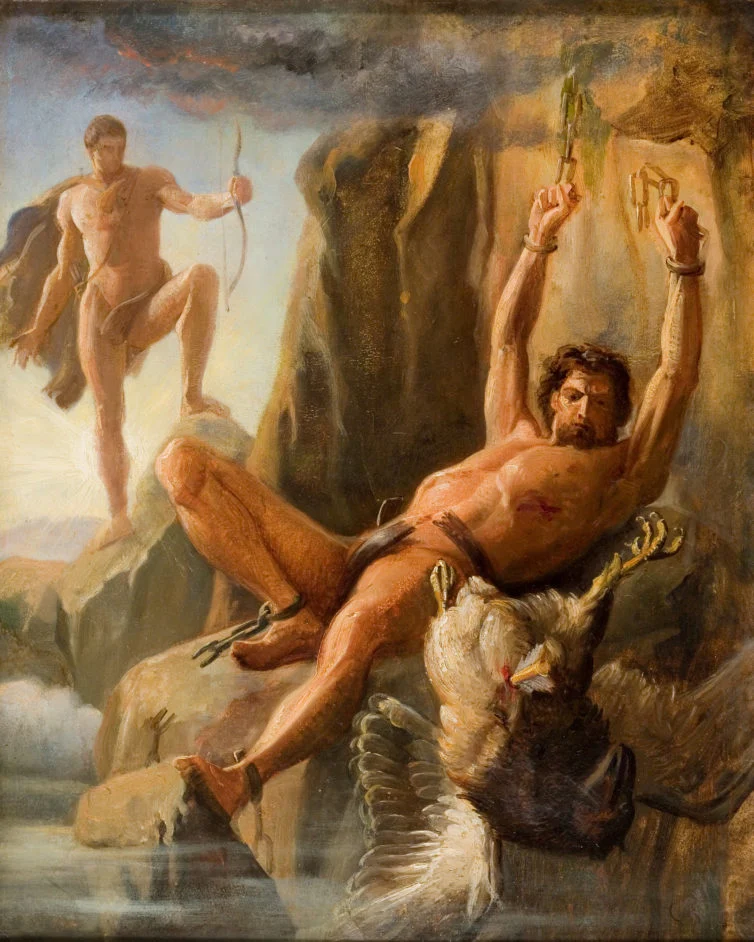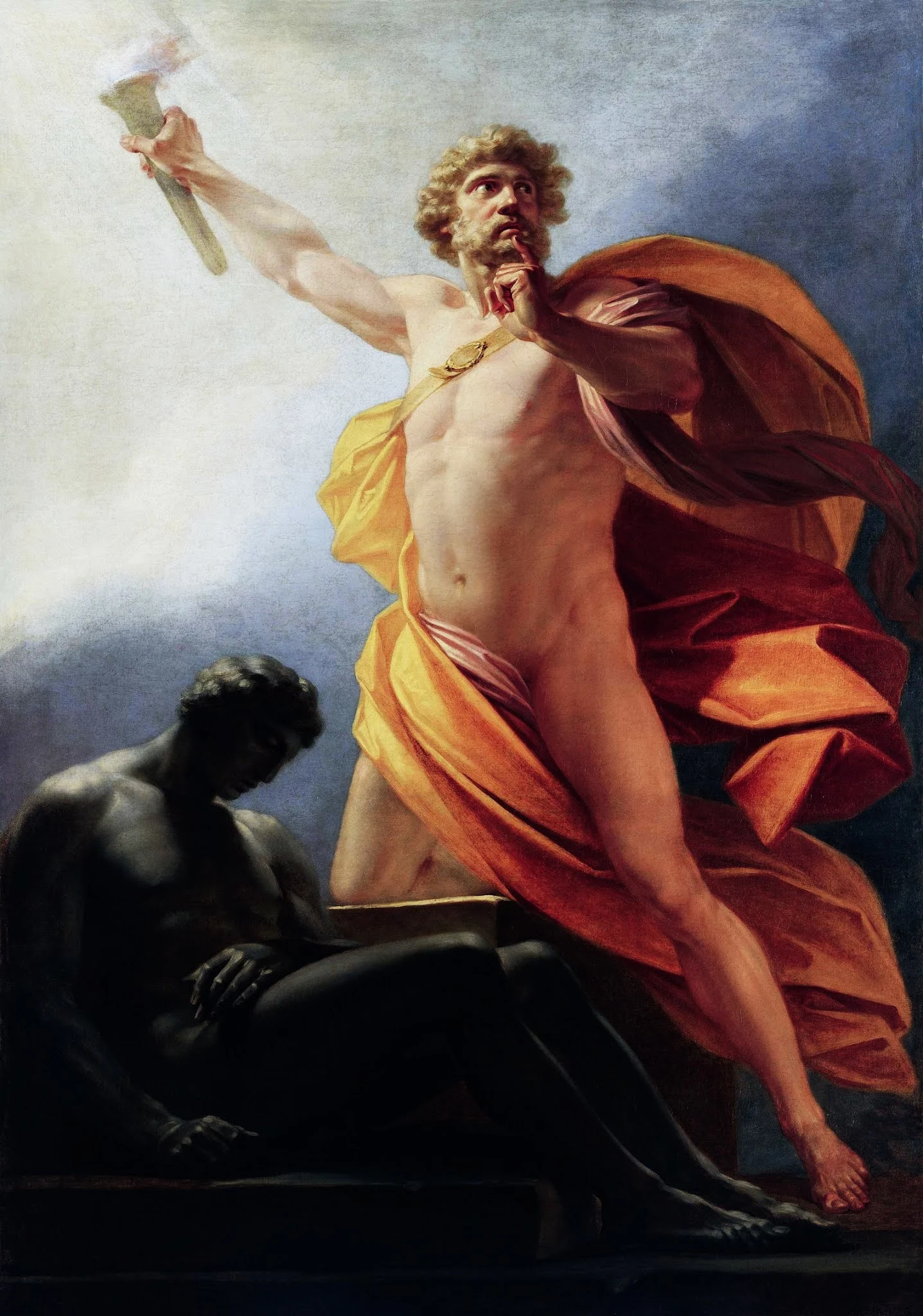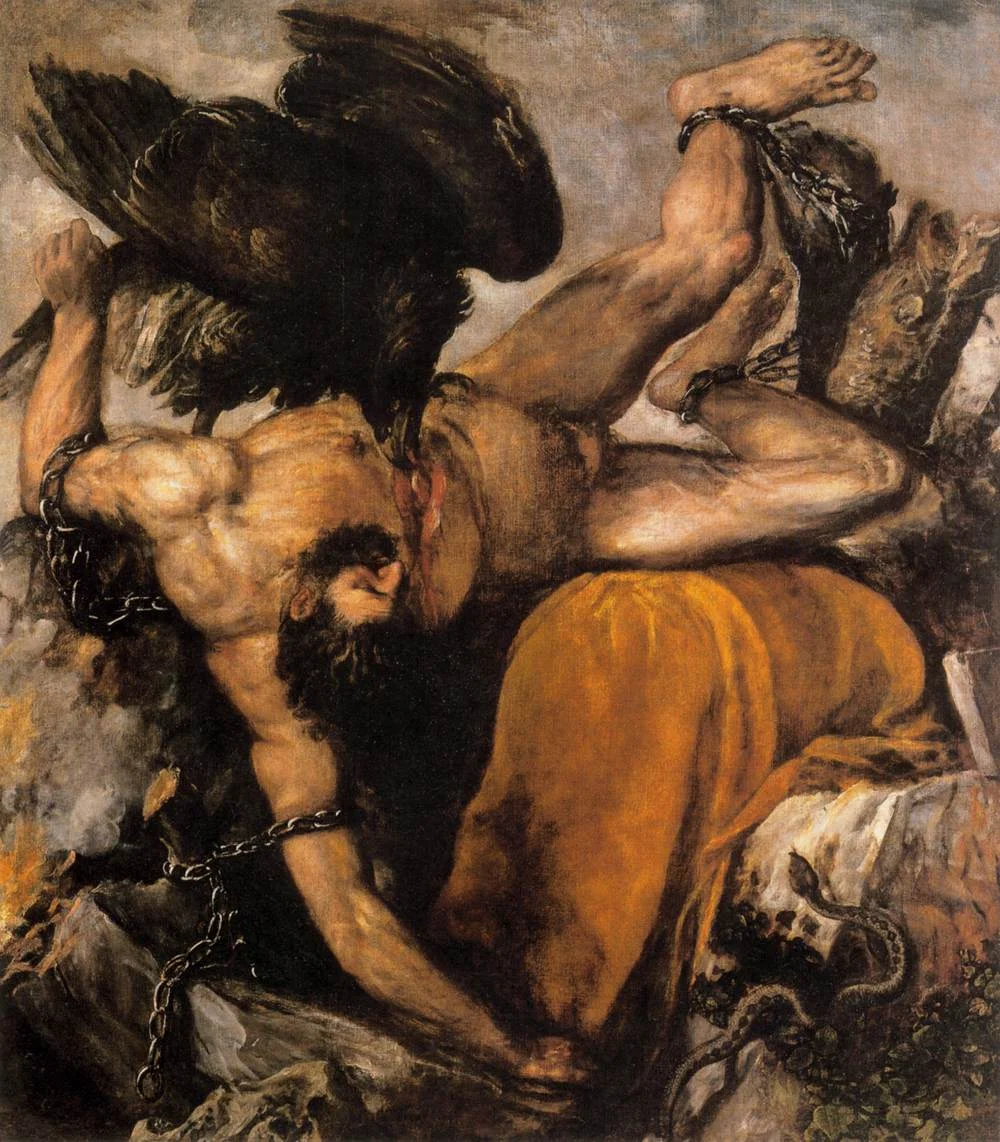Why did Prometheus' liver regenerate?
For giving fire to mortals, the titan Prometheus was chained on Mount Caucasus and condemned to have his liver completely devoured every day by an eagle or a vulture. To endure the torture, his liver had to regenerate. Although not in such an extraordinary way, the human liver also regenerates itself. Does this mean that the Greeks knew this mechanism? One might also ask, why was his liver attacking him?
Who is Prometheus?
In general, from Hesiod to Oppianus of Anazarbus, Prometheus was the son of
the titan Jeapetus. In what there is not so much consensus is in the identity
of his mother, who usually were the oceánides Clímene or Asia, but also his
grandmother Gea or his aunt Temis. His siblings were Menetius, struck by Zeus'
lightning and imprisoned in Tartarus; Atlas, who ended up condemned to endure
the heavens, and Epimetheus, who instead condemned humanity by accepting
Pandora's gift.
By his name, for the Greeks he represented
foresight (Προμηθεύς, pro, "before" and metis, "intelligence"),
in contrast to his impulsive brother Epimetheus. However, his name could be
linked to the Sanskrit pra math, "to steal". Through this relationship, he
would be connected to the Hindu Matariswan, name of the fire god Agni in the
Rigveda or a being related to it. Alternatively, Hesychius of
Alexandria called him Itax, considering him a herald of the Titans.
Summary
Although he helped the Olympian gods in the Titanomachy, he was the classic
trickster god who transgresses the established norms, using his wit to test
their limits. In Mecone, according to Hesiod's Theogony, he sacrificed
a great ox. On the one hand, he hid the entrails, meat and fat in its belly,
while he covered the bones with shiny fat to make them look appetizing. He
then offered them to Zeus, but Zeus, knowing the deception, took the white fat
from the bones. This was meant to explain why the gods were offered the bones
in sacrifices if they were intended to curry favor with them, while humans
consumed the meat.
As punishment for his insolence, he forbade the
use of fire to men, so that they would have to eat the raw meat like animals,
but when he saw that someone had given it to him, he sent the first woman, the
creation of Hephaestus, to the land of mortals, bringing the golden age to an
end. For his part, Prometheus would be chained to Mount Caucasus so that an
eagle or vulture would daily devour his liver. As we are told in
Prometheus unbound by Aeschylus, Hermes told him that Zeus will also
cause the collapse of the mountaintop over him if he does not reveal who will
be the one to overthrow him, but Prometheus does not agree. Finally, Heracles
would kill the bird and free the titan, who would obtain immortality from
Chiron, who renounced it to die, because an arrow of Heracles soaked in the
poison of the hydra had hit him and caused him unbearable pain.
These events showed why Zeus hardened the life of humans, which in every age was more miserable. Additionally, it showed how the Chronid defeated on his own ground even the most intelligent of the Titans, so that rebelling was pointless. However, in Aeschylus' play, Zeus is a cruel and distrustful tyrant, acting through Cratos ("Power") and Bia ("Strength").
Functions
Based on this account, three related elements of this trickster god are
understood: fire, animal sacrifice and the ability to foresee the future and
act accordingly. This not only shows how humans can obtain divine favor by
sacrifices, but also opened the door to the discipline of extispicy, which,
through the inspection of organs, aimed to answer affirmatively or negatively
about the destiny of men. In this discipline, the first thing that was
performed was hepatoscopy, the observation of the liver, since it was believed
that the gods resided in it.
Prometheus was involved beyond what
was related by Hesiod and Aeschylus or the mentions of authors such as
Pseudo-Apolodorus. In addition to the use of Prometheus by Aristophanes in
The Birds or by Plato in Protagoras, it is known that, at least
since the 5th century BC, he was considered the creator of mankind. A fable
attributed to Aesop states that he created humans from mud and tears, a fact
repeated with variations by the Greek comic poets Menander and Philemon and
the Roman authors Ovid, Catullus, Horace and Propertius.
Dual inmortality
Immortality can be understood in several ways. In the simplest form, it
implies eternal life, as long as there is no obstacle that makes it
impossible, such as murder. To overcome this, there would be invulnerability,
which would prevent any threat, but would be a problem if it came from the
body itself. In the case of the Greek gods, their immortality is at another
level, because having eternal life, they could be wounded, torn to pieces or
subjected to other powers, but their existence remained. There are many
examples of this: As children, the Olympian gods survived being devoured by
their father; Typhon tore off Zeus' tendons but Zeus recovered when Hermes
gave them back to him; Zeus swallowed his first wife Metis, begetting Athena
in his head; the Titans dismembered Dionysus and devoured his pieces, but
Athena recreated him through her heart. Likewise, the gods enjoyed eternal
youth, unlike Titonus, whose immortality was granted by Zeus at the request of
Eos, without her sparing him from aging. With this in mind, although it did
not prevent his suffering, it is evident that Prometheus' immortality extended
to his organs.
However, a problem arises here. Immortality and
liver regeneration are a sine qua non for both enduring torture and extending
it indefinitely. Despite this, he receives immortality from Chiron. Although
the narratives of the story may vary in detail, Prometheus' immortality is
obligatory, especially when it would take thirteen generations for Herakles to
be born.
Both Chiron and Prometheus are characters distinguished by their intelligence and teaching who suffered from incurable pain from which they could not free themselves due to the privilege of immortality. Both are deprived of the pleasures of life and their pain is unbearable, unlike the wounds usually suffered by the gods. With his renunciation of immortality, Chiron takes Prometheus' place in the underworld, while the latter ascends to the heavens.
Importance of the liver
For the ancient Greeks, the liver had the same importance that would later be
given to the heart, since, before Aristotle, it was believed to be the origin
of blood. It was considered the source of life and divinity, so any damage to
the liver was considered lethal, as the ancient poets used to express. In
fact, in the Iliad, Hecuba expresses her desire to devour Achilles'
liver to avenge the death of her son, without considering the semi-divine
condition of the hero. This also showed the facet of the liver as the center
of passions, desire and emotions, which should be subdued by the reason
located in the head to avoid falling into delusions.
As Plato
recounts in Timaeus, divination through the liver compensated for the nature
of the aperitive soul that resided in the liver and lacked intellect. Although
in Greek divination the liver was just another organ, both in the Middle East
and in Etruria it had a special position. This practice originated in
Babylonia and Assyria and was transmitted to the Greeks in the Orientalizing
period (8th-7th century BC), when the Greeks expanded throughout the
Mediterranean and, through their colonies, came into contact with the peoples
of the Middle East. The myth of Prometheus told by Hesiod could also have been
transmitted at this time, having similarities with the myth of Ziusudra, where
Enki warned of the catastrophes sent by Enlil to wipe out humans.
Knowing
these details, there would be several reasons that would justify the eagle's
attack on the liver. In the first place, Prometheus' deception in the
sacrifice in Mecone would reflect how he would have been carried away by
emotions. In Prometheus in chains, he himself tells how he taught divination
to mankind, where the liver has a prominent position. Finally, the organ
devoured by the bird meant the most lethal damage known to the Greeks. In
short, the titan became Zeus' sacrifice to the bird, offering him the first
organ normally taken in this practice.
Anatomical knowledge
The livers used in hepatoscopy were from animals, since it was considered
that, unlike humans, they would not wait for death, so they would not suffer a
fear that would affect the premonitory signs. Thanks to this practice, they
could recognize the alterations of the hepatic lobes or the portal vein, which
they considered the door of the viscera, a detail that has been preserved in
their name. This is why the nocturnal regeneration of the organ in Prometheus
could be interpreted as a phenomenon observed by the Greeks, but nothing could
be further from the truth.
Just as the sharing of an eye by the
Graeae does not reflect a knowledge of transplantation, nor is the rebirth of
Dionysus through his heart a sign of cloning, the miraculous liver
regeneration of Prometheus does not imply that the Greeks knew this function.
Although the Greek term hepar (ηπαρ, "liver") originates from the word
hepaomai (ηπαομαι, "to cure, repair"), no testimonies are preserved to
show that the ancients knew of its regenerative capacity, not even in
Hippocrates or Galen.
Modern discovery
The oldest observation of hepatic regeneration was made by the French
anatomist Jean Cruveihier (1791-1874) in his description of liver cirrhosis
(hepar acinosum), where he mentions the development of acinar zones (grains
glanduleux) in contrast to the atrophy of the rest of the organ. Later, for
Theodor Ackermann (1825-1986), this regeneration would be limited to the
connective tissue of the bile ducts. Friedrich Theodor Frerichs (1819-1885)
recognized hypertrophy in syphilitic hepatitis, where the parenchyma, i.e. the
specific tissue of the organ, grew and replaced what was lost. However, it was
the German pathologist Emil Ponfick who, in 1890, observed that removing a
large part of the liver from rabbits without killing them did not alter the
liver's capacity. He then found that liver weight recovered in a matter of
weeks.
During the 20th century, the factors influencing this
regeneration were studied, focusing especially on the blood flow in the portal
vein. In 1931, Higgins and Anderson pioneered hepatectomy in rodents, where
they proved that the removal of 2/3 of the liver recovered within a week.
Nancy L. R. Bucher (1913-2017), with her studies in rats, would demonstrate
that the liver did not need stem cells to regenerate, but that the mature
hepatocytes themselves, among other cells, were redirected in the remaining
organ. Thus, although it can recover its full size, the liver does not recover
its lobes if it has lost them. Thanks to her, we also know the involvement of
insulin, glucagon, prostanglandins, growth factors and local cell-tissue
interactions.
It was not an original sentence
On Phocis and Euboea lived Tycius, a chthonic giant, son of Zeus and Elara.
Lest Hera discover his infidelity, Elara hid her son underground, where Gaea
nursed him until he grew large enough for his body to cover 9 acres. In
another version, Tycius grew so large before birth that he ruptured his
mother's womb, whereupon Gaea terminated the pregnancy. As an adult, possibly
encouraged by Hera, he attempted to rape Leto as he traveled from Panopeus on
the Phocis to Delphi. Hearing his cries, his children Apollo and Diana tried
to kill him with their arrows. As he was immortal, Zeus bound him in the
underworld, where two vultures fed on his liver, which regenerated.
This
myth is possibly older than that of Prometheus, being mentioned in the
Odyssey, first by Radamantis and then by Odysseus himself, who sees him in the
underworld. In contrast to Prometheus and Chiron, Tyrius would have been
considered the worst criminal for the worshippers of the Olympians. Like them,
his myth could be connected as his grandson Euphemus, Argonaut, sees
Prometheus' eagle circling around the Argo.
In the case of Tycius,
the vultures could devour his liver because it is the center of passions and
desire, serving as a kind of castration. The symbol of the vulture and its
position in the underworld highlighted contempt by not differentiating it from
a corpse. Unlike Prometheus' eagle, the vultures came every new moon. In
Hyginus' account, instead it was a serpent that devoured his liver.
Sources
- Dougherty, C. (2006). Prometheus. Routledge.
- Daly, K. N., & Rengel, M. (2009). Greek and Roman mythology, A to Z. Infobase Publishing.
- Hsu, K. L. (2021). Wounded Immortals: The Painful Paradoxes of Prometheus and Chiron. In The Body Unbound (pp. 79-100). Palgrave Macmillan, Cham.
- Power, C., & Rasko, J. E. (2008). Whither prometheus' liver? Greek myth and the science of regeneration. Annals of internal medicine, 149(6), 421-426.
- Collins, D. (2008). Mapping the entrails: The practice of Greek hepatoscopy. American Journal of Philology, 319-345.
- Helling, T. S., & Azoulay, D. (2020). On Regeneration. In Historical Foundations of Liver Surgery (pp. 133-143). Springer, Cham.
-
Taub, R. (2004). Liver regeneration: from myth to mechanism. Nature reviews Molecular cell biology, 5(10), 836-847.
- Tiniakos, D. G., Kandilis, A., & Geller, S. A. (2010). Tityus: a forgotten myth of liver regeneration. Journal of hepatology, 53(2), 357-361.
- Roffi, L. (2012). Liver in mythology: A different version of Tityos’ myth. Journal of hepatology, 57(3), 710-711.
- Riva, M. A. (2012). Reply to “Liver in mythology: A different version of Tityos’ myth”. Journal of hepatology, 57(3), 711.








Comments
Post a Comment